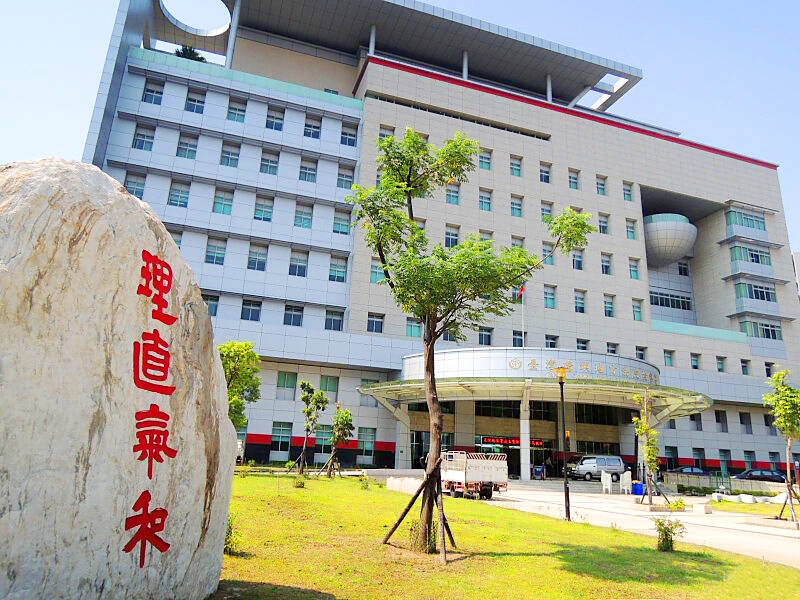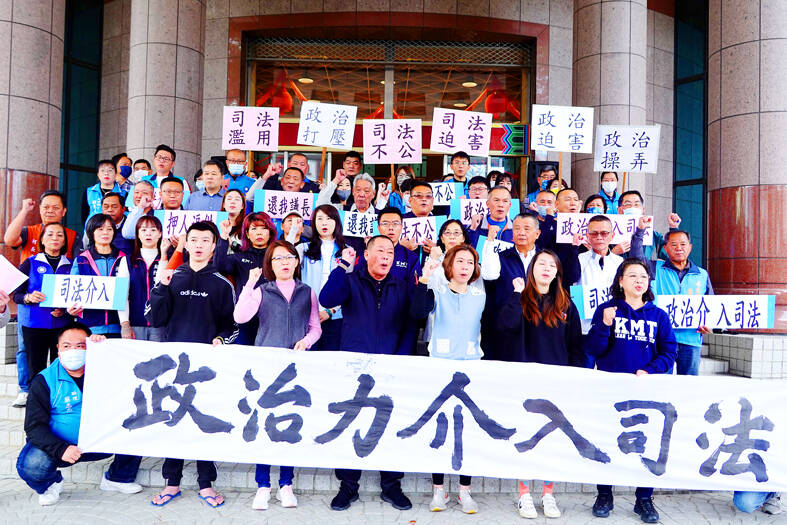The Ciaotou District Prosecutors’ Office in Kaohsiung has indicted a man on suspicion of recruiting people for sponsored tours to China, during which they were urged to vote for specific presidential candidates next month.
China Pan-Blue Association member Chen Chih-cheng (鄭志成) is the first person to be charged in one of many Chinese election interference cases prosecutors are investigating in the lead-up to the Jan. 13 presidential and legislative elections.
Cheng was charged with contravening the Anti-Infiltration Act (反滲透法), the Presidential and Vice Presidential Election and Recall Act (總統副總統選舉罷免法) and the Public Officials Election and Recall Act (公職人員選舉罷免法).

Photo: Wu Cheng-feng, Taipei Times
From May, Cheng recruited about 140 Taiwanese to visit China on tours mostly paid for by China’s Taiwan Affairs Office (TAO), prosecutors said.
Each person only needed to pay between NT$10,000 and NT$20,000, and Cheng received NT$2,000 for each person he recruited, they said.
The tour groups met with representatives from the TAO and the Chinese United Front Work Department, who urged them to vote for the “pan-blue camp” and “to remove the Democratic Progressive Party government from office,” prosecutors said.

Photo: CNA
In other election news, Pingtung County Council Speaker Chou Tien-lun (周典論) was yesterday detained on suspicion of buying signatures for Hon Hai Precision Industry Co (鴻海精密) founder Terry Gou (郭台銘) to help him get the endorsements needed for to run in the presidential election.
Pingtung County prosecutors said that after receiving a tip-off that Chou had bought signatures for Gou for NT$200 each, they raided Chou’s residence at about 6am on Monday and took him in for questioning.
Suspecting Chou had breached the Presidential and Vice Presidential Election and Recall Act, prosecutors filed a motion to detain him, which the Pingtung District Court approved early yesterday, the Pingtung District Prosecutors’ Office said.
Chou denied buying signatures and said that the funds involved were wages given to staffers to collect signatures, district court judge Wang Yi-chi (王以齊) said.
The judge did not accept Chou’s version of events as many witnesses testified that the fee was used to buy signatures, testimony that was corroborated by evidence, Wang said.
Gou announced his bid to run for president as an independent in late August.
Despite collecting enough signatures, he dropped out of the race and did not register his candidacy by the Nov. 24 deadline.

The US government has signed defense cooperation agreements with Japan and the Philippines to boost the deterrence capabilities of countries in the first island chain, a report by the National Security Bureau (NSB) showed. The main countries on the first island chain include the two nations and Taiwan. The bureau is to present the report at a meeting of the legislature’s Foreign Affairs and National Defense Committee tomorrow. The US military has deployed Typhon missile systems to Japan’s Yamaguchi Prefecture and Zambales province in the Philippines during their joint military exercises. It has also installed NMESIS anti-ship systems in Japan’s Okinawa

‘WIN-WIN’: The Philippines, and central and eastern European countries are important potential drone cooperation partners, Minister of Foreign Affairs Lin Chia-lung said Minister of Foreign Affairs Lin Chia-lung (林佳龍) in an interview published yesterday confirmed that there are joint ventures between Taiwan and Poland in the drone industry. Lin made the remark in an exclusive interview with the Chinese-language Liberty Times (the Taipei Times’ sister paper). The government-backed Taiwan Excellence Drone International Business Opportunities Alliance and the Polish Chamber of Unmanned Systems on Wednesday last week signed a memorandum of understanding in Poland to develop a “non-China” supply chain for drones and work together on key technologies. Asked if Taiwan prioritized Poland among central and eastern European countries in drone collaboration, Lin

Renewed border fighting between Thailand and Cambodia showed no signs of abating yesterday, leaving hundreds of thousands of displaced people in both countries living in strained conditions as more flooded into temporary shelters. Reporters on the Thai side of the border heard sounds of outgoing, indirect fire yesterday. About 400,000 people have been evacuated from affected areas in Thailand and about 700 schools closed while fighting was ongoing in four border provinces, said Thai Rear Admiral Surasant Kongsiri, a spokesman for the military. Cambodia evacuated more than 127,000 villagers and closed hundreds of schools, the Thai Ministry of Defense said. Thailand’s military announced that

CABINET APPROVAL: People seeking assisted reproduction must be assessed to determine whether they would be adequate parents, the planned changes say Proposed amendments to the Assisted Reproduction Act (人工生殖法) advanced yesterday by the Executive Yuan would grant married lesbian couples and single women access to legal assisted reproductive services. The proposed revisions are “based on the fundamental principle of respecting women’s reproductive autonomy,” Cabinet spokesperson Michelle Lee (李慧芝) quoted Vice Premier Cheng Li-chiun (鄭麗君), who presided over a Cabinet meeting earlier yesterday, as saying at the briefing. The draft amendment would be submitted to the legislature for review. The Ministry of Health and Welfare, which proposed the amendments, said that experts on children’s rights, gender equality, law and medicine attended cross-disciplinary meetings, adding that